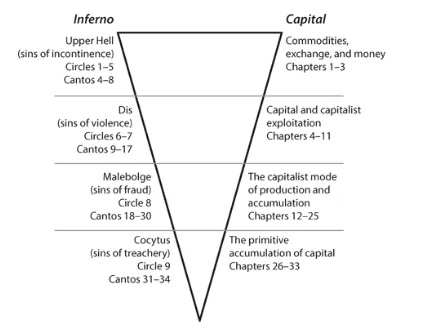
I can’t argue with William Roberts. Reading Capital, Volume 1, feels like Hell. Marx, in the French preface, likens the reading to the climbing of a mountain. I’m taking baby steps, though.
There is no royal road to science, and only those who do not dread the fatiguing climb of its steep paths have a chance of gaining its luminous summits.
Preface to French Edition
STUDYING DAS KAPITAL: Part 1 (of 8)
William Roberts argued persuasively in his book “Marx’s Inferno” that Karl Marx structured Das Kapital Volume 1 to parallel Dante’s Inferno. Look over the diagram below which is taken from Robert’s book.



You must be logged in to post a comment.